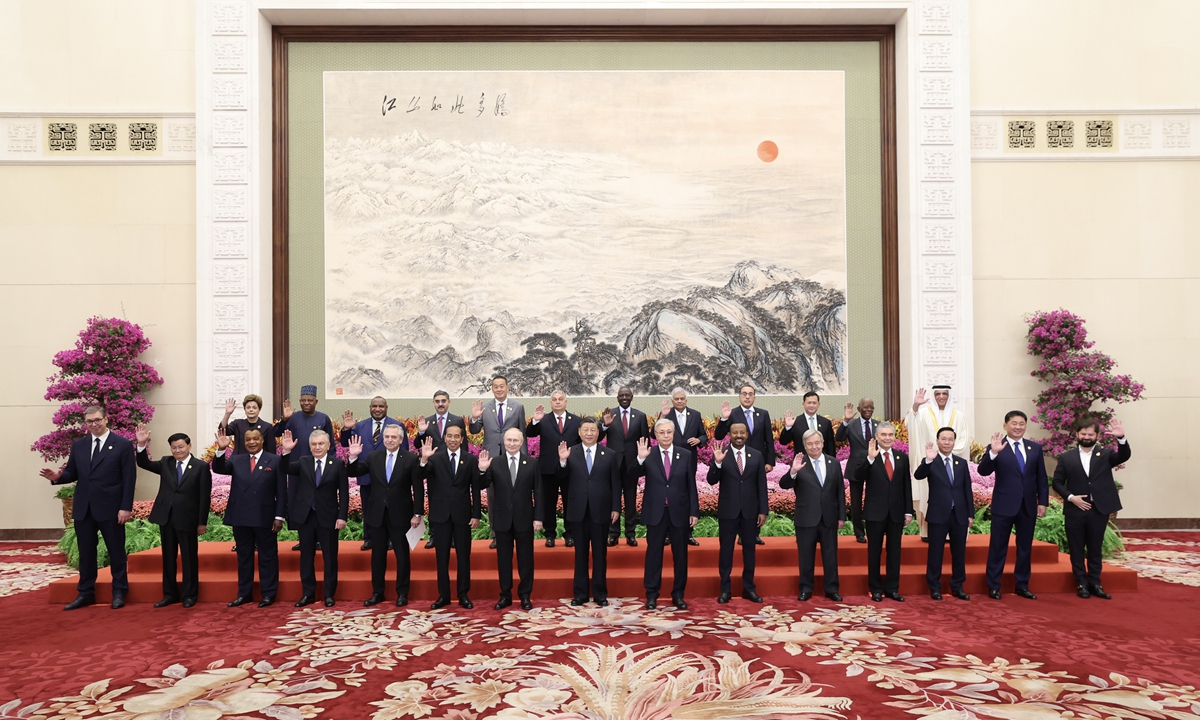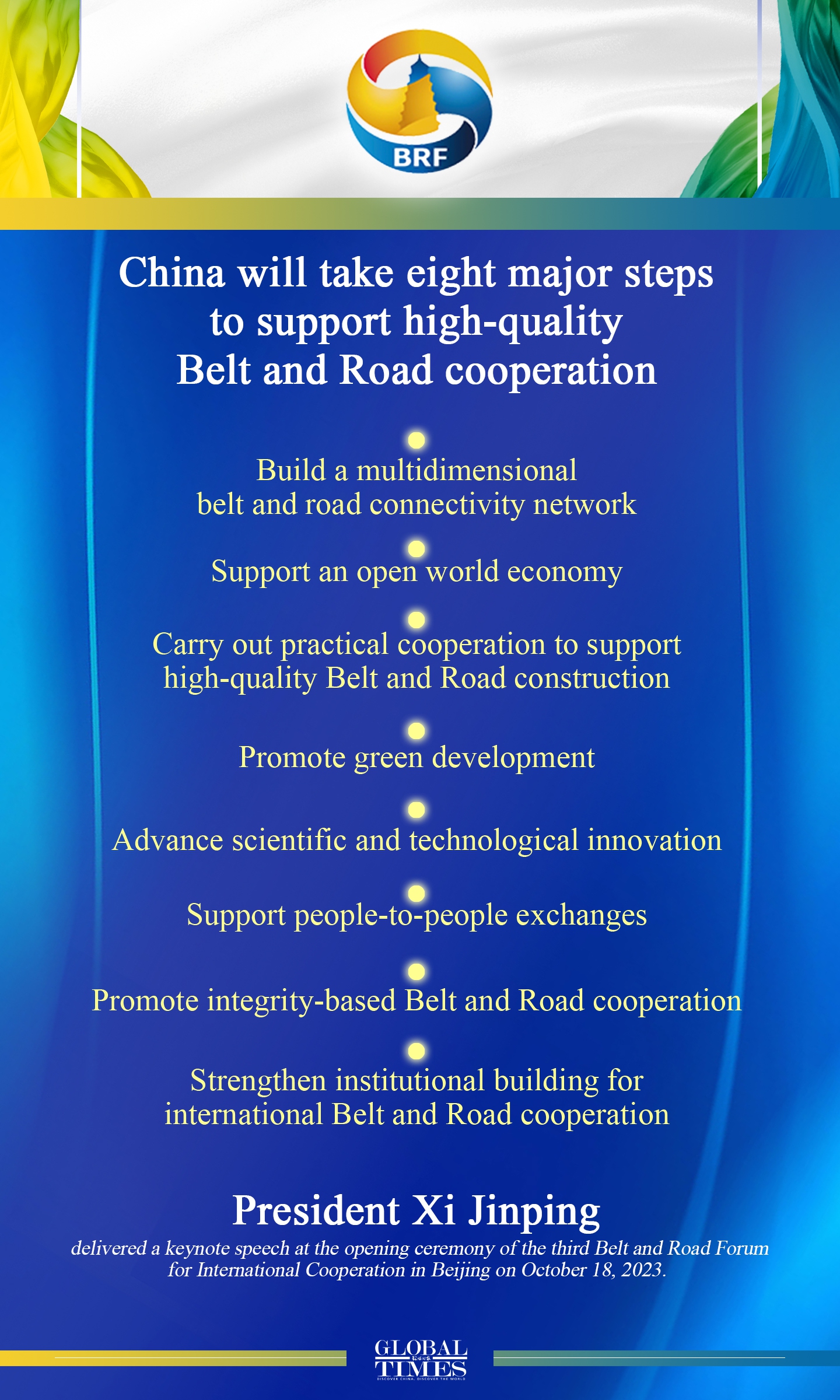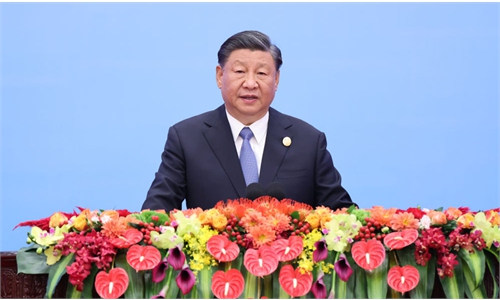/
China and the US are truly different. China calls for and supports global construction, such as building roads, bridges and ports, while the US encourages war and supports confrontation. Currently, there are two wars in the world, and China has not joined either of them. China is calling for a ceasefire and resolving issues through negotiations. In contrast, the US "stands with" one side in both wars, providing money and weapons to support that side in achieving victory.
> You cannot help but think that there may be a major reason behind this. China is a big nation in construction and infrastructure development, so we encourage the world to join us in promoting infrastructure construction, allowing China's tremendous advantages to benefit the world. On the other hand, the US has the fastest weapon iteration and it's the No.1 military power in the world. Hence, it needs tension and frequent wars because the more wars it fights in, the more important the US becomes, and also the better its weapons sell. There will be also more countries seeking US' assistance from different perspectives.
China maintains cooperative relationships with all countries, and the Belt and Road Initiative (BRI) is the world's largest platform for consultation, construction, and cooperation. The US claims to be a leader, but often acts more like a kidnapper. It promotes various conflicts and tensions, and then offers the so-called "protection," causing many countries to be swept along in the major conflicts and situations driven by the US.
China sends engineering teams and machinery to various parts of the world, while the US deploys military forces. American aircraft carriers roam the major oceans, and US intelligence agencies are also very active. American modern war films and spy films have an endless supply of real-life materials.
After the Cold War, peace and development had become the theme of the world. However, it was the US that destroyed the cooperative relationship among major countries and brought the world back to the era of the so-called "great power competition." It seems that the US is familiar with and only adapts to a pattern of fighting and confrontation in order to regain its sense of purpose.
Let the US go crazy and provoke hatred around the world. China needs to stick to its own path. A bright future cannot be achieved through fighting alone; it must be built through cooperation, just like the principles advocated by the BRI. China has sufficient military strength to defend itself, and our development path aligns with the aspirations of countries around the world. The return to the path instigated by the US will surely become narrower in the course of time, while the future path pioneered by China will only become wider.
- BRI provides clear path for world in turbulence to restore ‘peace, development’ A foreigner is being interviewed by Chinese journal...
- The Israel Defense Forces said Saturday it was preparing to implement “a wide range of offensive operative plans,” which will include “an in...
- Birds fly as smoke billows following an Israeli airstrike in the southern Gaza Strip city of Rafah, on

Chinese President Xi Jinping poses for a group photo with distinguished guests attending the third Belt and Road Forum for International Cooperation at the Great Hall of the People in Beijing, capital of China, October 18, 2023. Xi on Wednesday attended the opening ceremony of the third Belt and Road Forum for International Cooperation and delivered a keynote speech. Photo:Xinhua
Chinese President Xi Jinping on Wednesday announced eight major steps China will take to support high-quality Belt and Road cooperation in a keynote speech at the opening ceremony of the third Belt and Road Forum (BRF) for International Cooperation, with guests of the event and Chinese experts acknowledging what China and its partners worldwide have accomplished in the past decade. They're also confident that the encouraging message and promises will start a new journey for another "golden decade."
The opening ceremony was attended by representatives, including heads of state, government chiefs and senior officials, from over 140 countries and 30-plus international organizations, according to the Xinhua News Agency. Analysts said the grand event has showed the influence of China and the Belt and Road Initiative (BRI), and in the next 10 years, with continuous efforts by China and other members of the international community, the BRF is able to become the biggest and most important multilateral platform for global development and governance.
Experts said in the next step China will keep its investment but will diversify the source of funds by encouraging and attracting more funds from private capitals inside and outside China, to push for the internationalization of the yuan, and based on the current geopolitical situations, to reduce and avoid risks, and promote the projects based on characteristics of various regions in different continents, and make high-quality development better serve the interests of more countries and more people.
"Belt and Road cooperation, robust and fruitful in its first decade, is now full of dynamism and vitality. We must embark with drive and enthusiasm on the new journey toward another golden decade," Xi told the guests, including state leaders and heads of international organizations, when giving a toast at the banquet held at the Great Hall of the People on Tuesday.
Encouraging message
Among the eight major steps announced by Xi, first, China will build a multidimensional Belt and Road network. "The country will speed up high-quality development of the China-Europe Railway Express, participate in the trans-Caspian international transportation corridor, and host the China-Europe Railway Express Cooperation Forum," President Xi said.
Xi noted that China, together with other parties, will build a new logistics corridor across the Eurasian continent linked by direct railway and road transportation.
Second, China will support an open world economy, with its total trade in goods and services expected to exceed $32 trillion and $5 trillion respectively in the 2024-2028 period. Third, China will carry out practical cooperation for the BRI. The country will promote both signature projects and "small yet smart" livelihood programs, the president said.
Xi vowed more financing support for BRI projects on the basis of market and business operation, noting that the China Development Bank and the Export-Import Bank of China will each set up a 350 billion yuan ($48.75 billion) financing window, and that an additional 80 billion yuan will be injected into the Silk Road Fund.
Analysts said 350 billion yuan each plus 80 billion yuan, which would be 780 billion yuan ($106 billion), if this goal is achieved, the money will be able to afford 20 more "Jakarta-Bandung high-speed railway" projects, which cost about $5.1 billion, or 2.5 "China-Pakistan Economic Corridor" projects, which is a flagship project of the BRI estimated to cost $46 billion investment in total.
Wang Yiwei, director of the Institute of International Affairs at the Renmin University of China, told the Global Times that the plan of financing will be able to attract more funds from private capitals around the globe, and will also promote the reform of Chinese State-owned companies, and will also further advance the internationalization of the yuan.
"The two financing windows announced by the Chinese President will play a crucial role in mobilizing more international funding for BRI projects, meanwhile offering an open, transparent way that could invite more nations into the joint construction of BRI," said Xu Liping, the director of the Center for Southeast Asian Studies at the Chinese Academy of Social Sciences.
"For instance, for some nations in the Middle East, they may have substantial funds but limited investment channels. But this can enable them to find a way to invest while also offering help for those in urgent need for the capital," Xu told the Global Times on Wednesday, noting that the transparency and internationalization of the financing channels are also designed to counter Western smears such as the so-called "debt traps."
China will carry out 1,000 small-scale livelihood assistance projects, and enhance vocational education cooperation through Luban Workshops and other initiatives, Xi said during his speech, adding that more efforts will be taken to ensure the safety of BRI projects and personnel. The CEO Conference held during the forum saw the conclusion of agreements worth $97.2 billion, he said.
Liang Haiming, dean of the Hainan University Belt and Road Research Institute, told the Global Times on Wednesday that these data showed the BRI is very popular and welcomed globally, and that's why entrepreneurs from all over the world can reach deals worth $97.2 billion at the CEO conference.
Shen Yi, an expert on international relations at Fudan University, said that "Although some Western political elites and media outlets are being hostile toward the BRI, we can barely hear criticism from Western companies. Why? Because they are also earning money from it. Many BRI projects are open for international participation with transparency and fairness."
On building a multidimensional Belt and Road connectivity network, Zilola Yunusova, a spokesperson of the Uzbek Embassy in China, shared some encouraging news. Yunusova told the Global Times that "Work is currently under way on a trilateral basis on the China-Kyrgyzstan-Uzbekistan railroad construction project. The realization of this project will have a positive impact on the economic development of the republic and will be an important link in the formation of the China-Central Asia-West Asia Economic Corridor - one of the key corridors of the Belt and Road."
Foreign guests are confident about China's determination and the actions that China announced for starting another "golden decade." Hon Viliame R. Gavoka, Fiji deputy prime minister and minister for tourism and civil aviation, also a guest at the opening ceremony, told the Global Times on Wednesday that "Knowing what you have accomplished in the last 10 years. I'm very confident this [the eight major steps] will also be accomplished."

Chinese President Xi Jinping on Wednesday announced eight major steps China will take to support high-quality Belt and Road cooperation when addressing the opening ceremony of the third Belt and Road Forum for International Cooperation: GT Graphic
High-quality development
Dennis Munene Mwaniki, executive director of the Africa Policy Institute, told the Global Times about his expectations for the future, saying that "China and African countries, including Kenya, should focus more on boosting the green silk road, health silk road, and a digital silk road," as the expert hopes the BRI can improve Africa's health system and help the continent to tap into global markets that can link the African Continental Free Trade Area with other free trade areas such as the Asia-centric Regional Comprehensive Economic Partnership (RCEP).
In response to these sorts of expectations from not only Africa but also many other regions worldwide, apart from the first three major steps covering infrastructure construction and financing, Xi announced concrete moves to boost high-quality BRI cooperation.
Fourth, China will continue to promote green development. The country will further deepen cooperation in areas such as green infrastructure, green energy and green transportation, and step up support for the BRI International Green Development Coalition. Fifth, China will continue to advance scientific and technological innovation. China will continue to implement the Belt and Road Science, Technology and Innovation Cooperation Action Plan, and hold the first Belt and Road Conference on Science and Technology Exchange, noted Xi.
China will put forward the Global Initiative for Artificial Intelligence (AI) Governance at this year's forum. "We stand ready to increase exchanges and dialogue with other countries and jointly promote sound, orderly and secure AI development in the world," Xi said.
AI is a cutting-edge technology, yet there is no international consensus on making rules to govern it. Some Western countries with technological advantages are even using it to isolate and contain other countries' development, so as a major power with capability, China needs to step forward in this area and guide and improve international cooperation and coordination, experts said.
Sixth, China will support people-to-people exchanges, and seventh, China will promote integrity-based Belt and Road cooperation, Xi said.
Together with its cooperation partners, China will release the Achievements and Prospects of Belt and Road Integrity Building and the High-Level Principles on Belt and Road Integrity Building, and establish the Integrity and Compliance Evaluation System for Companies Involved in Belt and Road Cooperation, Xi announced. "We will also work with international organizations to carry out research and training on promoting integrity in Belt and Road cooperation," the president said.
Xu said that action to promote integrity-based cooperation is aimed at "addressing concerns raised by Western media about the lack of transparency in some BRI projects." As Belt and Road construction has transitioned to a phase of high-quality development, a greater alignment with market dynamics and international standards will be significant.
In order to respond to concerns as well as dispel rumors like "debt trap diplomacy" and "lack of transparency," the best way is to let actions speak louder than words, and by promoting integrity-based Belt and Road cooperation, the BRI will not just benefit the economic development of the Global South, but will also improve the capability of governance and morality among officials in developing countries, a remarkable achievement that can bring sustainable benefits, experts said.
Eighth, China will strengthen institution building for international Belt and Road cooperation. China will work with its BRI partner countries to strengthen the building of multilateral cooperation platforms covering energy, taxation, finance, green development, disaster reduction, anti-corruption, think tanks, media, culture and other fields, Xi said. China will continue to host the BRF and establish a secretariat for the Forum, he said.
Future and hopes
Apart from promising future, experts warned that challenges and problems should also be noticed. "The BRI still faces many new challenges, including geopolitical challenges caused by containment and hostility from the US and its alliance system, changes brought about by the new technological revolution, new pressures on global warming and climate change issues, and terrorism and turmoil. China should improve its ability to respond to risks and enhance the stability of the BRI," said Huang Renwei, executive director-general of the Fudan Institute for Belt and Road and Global Governance.
In the future, based on the situation that has emerged in recent years, including the Ukraine crisis and the renewed outbreak of the Palestine-Israel conflict, as well as the US-launched new cold war against China, the BRI can make adjustments to deal with these challenges. Huang said the BRI can be specifically designed for different regions based on their characteristics, and increase efforts to accomplish medium-size projects that are closely related to people's livelihoods to deliver them as quickly as possible. For large projects that take longer time, the priority would be risk management and control.
Foreign leaders and guests have voiced their confidence in the BRI's future. Gyorgy Matolcsy, governor of the National Bank of Hungary, gave his opinion at a sub forum about why the BRI is successful and accepted worldwide. "First of all, it's fair and just," and for the about 150 countries that participate in the BRI, they all benefit, "so it's not just about win-win, but win, win, win, win, win…."
Boris Tadic, former president of Serbia, said at a sub forum of think tanks at the BRF on Wednesday that in the past, people consider that the US is the country of hope, but now, China is the hope. He noted that China has chance to create many opportunities for the world by promoting the harmony of international relations and the BRI has done much to contribute in this aspect.
With the advancement of the high-quality construction of the BRI, more enterprises from participating countries as well as other countries have jointly constructed a more diverse and vibrant economic ecosystem for the Belt and Road.
Chinese President Xi Jinping on Wednesday announced eight major steps China will take to support high-quality Belt and Road cooperation.
This year not only marks the milestone of the 10th anniversary of the Belt and Road Initiative (BRI) but also serves as a testament to the transformative impact it has had on the numerous countries in the Global South. As the world faces a complex web of geopolitical intricacies and intense confrontations, the third Belt and Road Forum for International Cooperation (BRF) offers a refreshing platform and sustainable way to achieve harmony and win-win, Dato Majid, president of the Malaysia-China Friendship Association and former Malaysian ambassador to China, told the Global Times on Wednesday.










